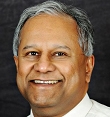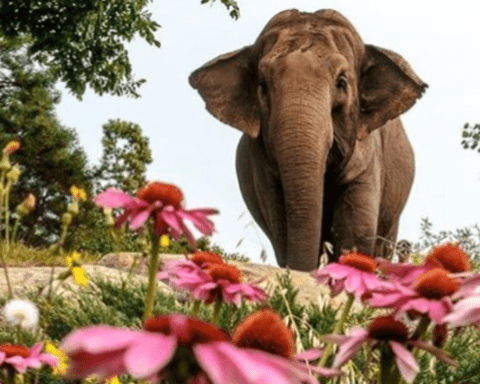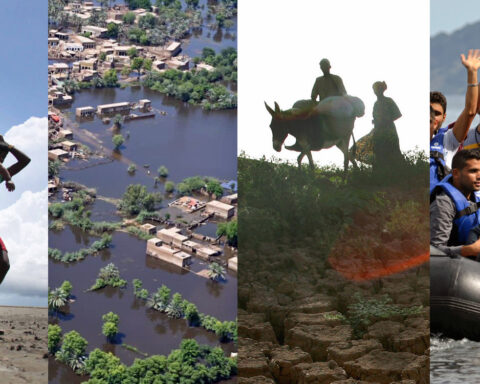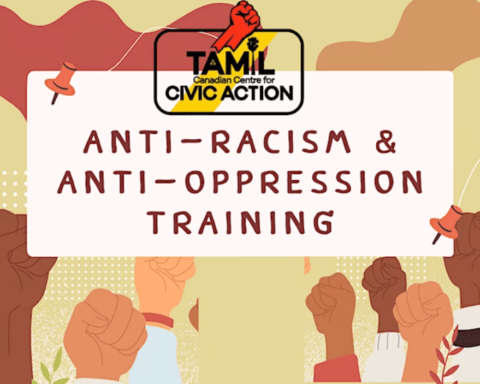That a public event held in the memory of a slain Sri Lankan journalist was not immune to tensions caused by the civil strife there is a reminder of its intensity four years after the defeat of Tamil Tiger forces.
The presence of private security at the Lasantha Wickrematunge Memorial Lecture in Toronto last weekend meant that the organizers were not taking chances with emotions that are still raw. This was reinforced when moderator Naheed Mustafa warned participants that they would be whisked away if deocrum was not maintained at the event, hosted jointly by Sri Lankans Without Borders and the South Asian Journalists Association.
Rather unusually it began with apologies on two counts – for the last-minute dropping out by two featured speakers for “personal reasons” and for the panel being not representative of the fractured South Asian island’s ethnic mix. But to the credit of the panelists present, they brought fair and rare perspective to the lack of media freedom and the resultant ills afflicting a country that should be cashing in on the peace dividend.
“No other profession calls on its practitioners to lay down their lives for their art save the armed forces – and, in Sri Lanka, journalism.” This was the opening sentence of the article Wickrematunge wrote days before he was killed in 2009. This message about the messenger being targeted could not been starker.
“It is tragic that media censorship and political oppression against which Lasantha [Wickrematunge] struggled valiantly then, and for which he died, persist four years after his death,” said J.S. Tissainayagam, one of the panelists and an acclaimed journalist who is in exile after being arrested and sentenced to 20 years of imprisonment in Sri Lanka for criticizing the government’s treatment of Tamil civilians affected by the war.
Pernicious effect
“Following the military campaign, there are fundamentally two ways whereby the present government has imposed censorship. One is through legislation; the other by physically targeting journalists. But more importantly, there were new regulations that came into effect after armed combat ended in May 2009. They mostly pertain to restricting the dissemination of news on the internet and via telecommunication networks,” said Mr. Tissainayagam.
Pointing to the empty chair on the dais with the portrait of Prageeth Ekneliayagoda, he said the journalist disappeared from Colombo eight months after the military campaign had ended. Today the government’s only answer to his disappearance is to orchestrate a smear campaign against his wife and refusal to conduct a credible investigation into the incident.
“The effect of these methods of terrorizing the media has been twofold. Its impact on the media itself is forcing journalists to censor themselves. But its reach is much wider. It also closes the mind and our ability to critique and question the status quo,” Mr. Tissainayagam said.
He said there is more than one reason for the government’s persistence on imposing tight restrictions on the media. The most important is that the government does not want reports of its conduct during the war in the Tamil north to undermine post-war consolidation.
“The government is deeply concerned these stories will infiltrate southern Sri Lanka and the moral ugliness of such savagery will be repugnant to many Sinhalese. The fear is that an open discourse will persuade the vast majority of Sinhala people within the country to demand an impartial investigation into war crimes of the political leadership. Thereby the government will lose its support base,” Mr. Tissainayagam said.
‘Handbrakes on’
The media in the Sinhala south too is subject to privations because if war crimes-related issues are to be effectively concealed, censorship has to be blanket. ”Secondly, repression of the people in one part of the country, inevitably begets repression in other areas too. And therefore the [Mahinda] Rajapakse government is careful to contain incriminating stories from the South as well.”
Mr. Tissainayagam said it was unfortunate that the self-preservation policy of the current government runs contrary to its rhetoric of reconciliation. “If you want the Sinhalese and Tamils to reconcile, there has to be first and foremost a frank dialogue between the two groups. But if, official strategy is to prevent that, by ghettoizing the North and censoring media throughout the country, reconciliation will only remain in words, not deeds.”
Sanjana Hattotuwa, the founder and curator of Groundviews, a Sri Lankan website that offers alternative perspectives on human rights and governance, said that despite censorship being not official, journalists are extremely worried about crossing the unknown redlines of the government. This has lead to unprofessionalism among journalists and the new trend of censorship by buying out media houses as against the cruder form of physical elimination, Mr Hattotuwa said. ”Self-censorship is so perverse that even senior journalists who have been physically attacked do not want these incidents reported for fear of persecution by the government. Expecting the mainstream media to push against the boundaries penning them in is like trying to push a car with the handbrakes on.”
Diaspora role
On what role the diaspora can play to set right the situation, Mr Hattotuwa pointed out the plurality of the Tamil and Sinhala solitudes and their entrenched politics. However, he said they can help by writing on a sustained basis about the democracy deficit facing the country. “They must critically engage with the country and expose the ugliness that tourist brochures will not tell.”
Mr. Tissainayagam said as media in Sri Lanka is an integral part of a highly prejudiced society, it is for the diaspora to engage the international community to push for reforms in the home country.
Malinda Seneviratne, a Sri Lankan journalist who was expected to participate in the event via Skype, said in remarks read out by the moderator that technology has provided instruments that can best the most pernicious of censorship mechanisms. He said these means can be used and abused and that it can both minimize realities as well as inflate falsehoods. “That kind of truth-cooking is not the preserve of governments. Indeed spin and twist can be off-shored and this happens frequently too,” Mr. Seneviratne said.
Proliferation of spaces does not mean that the general public is better informed, said Mr Hattotuwa. “As media literacy is lacking in Sri Lanka, diaspora conversations has not influenced the domestic discourse right now. It might happen in the future.”
Tim Uppal, the federal minister of state for multiculturalism, who put in an appearance during the event, expressed Canada’s concern about human rights and democracy deficit in Sri Lanka. He hoped that the country will live up to the British Commonwealth’s values. That the two immigrant groups in Toronto – Tamil and Sinhala – lived up to the values of informed debate without incident is small consolation for now. – New Canadian Media
Ranjit is a Toronto-based writer with interest in Canadian civic affairs, immigration, the environment and motoring. Maytree and Al Jazzera English alumnus.





